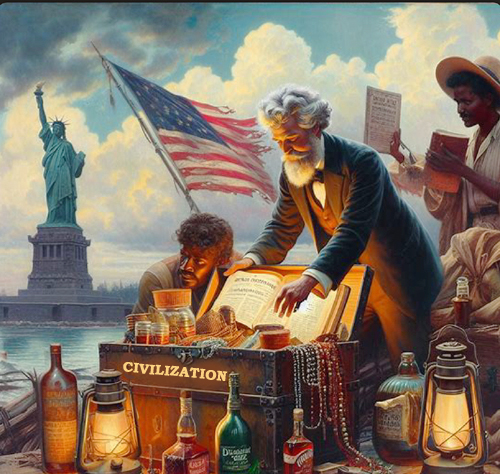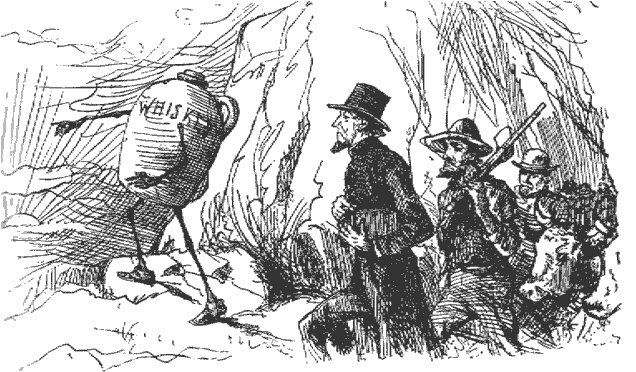

| Would it not be prudent to get our civilization
tools together, and see how much stock is left on hand in the way of Glass
Beads and Theology, and Maxim Guns and Hymn Books, and Trade Gin and Torches
of Progress and Enlightenment (patent adjustable ones, good to fire villages
with, upon occasion), and balance the books, and arrive at the profit and
loss, so that we may intelligently decide whether to continue the business
or sellout the property and start a new Civilization Scheme on the proceeds. - "To the Person Sitting in Darkness" |
 AI image created by Barbara Schmidt |
|
Is it, perhaps, possible that there are two kinds of Civilization--one
for home consumption and one for the heathen market? The only very marked difference between the average civilized man and
the average savage is that the one is gilded and the other is painted. Civilization is a limitless multiplication of unnecessary necessities. I have been reading the morning paper. I do it every morning--knowing
well that I shall find in it the usual depravities and basenesses and
hypocrisies and cruelties that make up civilization, and cause me to put
in the rest of the day pleading for the damnation of the human race. I
cannot seem to get my prayers answered, yet I do not despair. There is a great difference between feeding parties to wild beasts and
stirring up their finer feelings in an inquisition. One is the system
of degraded barbarians, the other of enlightened civilized people. There are many humorous things in the world; among them, the white man's
notion that he less savage than the other savages. If you will notice, there is seldom a telegram in a paper
which fails to show up one or more members & beneficiaries of our
Civilization as promenading with his shirt-tail up & the rest of his
regalia in the wash. Civilization largely consists in hiding human nature. When the barbarian
learns to hide it we account him enlightened. I believe that many a person has examined man with a microscope in every
age of the world; has found that he did not even resemble the creature
he pretended to be; has perceived that a civilization not proper matter
for derision has always been and must always remain impossible to him
-- and has put away his microscope and kept his mouth shut. Perhaps because
the microscopist (besides having an influential wife) was built like the
rest of the human race -- ninety-nine parts of him being moral cowardice.
... civilization are not realities, but only dreams; dreams of the mind,
not of the heart, and therefore fictitious, and perishable; that they
have never affected the heart and therefore have no valuable progress;
that the heart remains today what it always was, as intimacy with any
existing savage tribe shall show. Indeed the average of the human 'brain'
is not a shade higher today than it was in Egyptian times ten thousand
years ago. |
| What is a civilization, rightly considered? Morally, it is the evil passions
repressed, the level of conduct raised; spiritually, idols cast down, God
enthroned; materially, bread and fair treatment for the greatest number.
That is the common formula, the common definition; everybody accepts it
and is satisfied with it. Our civilization is wonderful, in certain spectacular and meretricious ways; wonderful in scientific marvels and inventive miracles; wonderful in material inflation, which it calls advancement, progress, and other pet names; wonderful in its spying-out of the deep secrets of Nature and its vanquishment of her stubborn laws; wonderful in its extraordinary financial and commerical achievements; wonderful in its hunger for money, and in its indifference as to how it is acquired; wonderful in the hitherto undreamed-of magnitude of its private fortunes and the prodigal fashion in which they are given away to institutions devoted to the public culture; wonderful in its exhibitions of poverty; wonderful in the surprises which it gets out of that great new birth, Organization, the latest and most potent creation and miracle-worker of the commercialized intellect, as applied in transportation systems, in manufactures, in systems of communication, in news-gathering, book-publishing, journalism; in protecting labor; in oppressing labor; in herding the national parties and keeping the sheep docile and usable; in closing the public service against brains and character; in electing purchasable legislatures, blatherskite Congresses, and city governments which rob the town and sell municipal protection to gamblers, thieves, prostitutes, and professional seducers for cash. It is a civilization which has destroyed the simplicity and repose of life; replaced its contentment, its poetry, its soft romance-dreams and visions with the money-fever, sordid ideals, vulgar ambitions, and the sleep which does not refresh; it has invented a thousand useless luxuries, and turned them into necessities; it has created a thousand vicious appetites and satisfies none of them; it has dethroned God and set up a shekel in His place. - "Papers of the Adam Family" |

Illustration
from first edition of LIFE ON THE MISSISSIPPI
| How solemn and beautiful is the thought that the earliest pioneer of civilization,
the van-leader of civilization, is never the steamboat, never the railroad,
never the newspaper, never the Sabbath-school, never the missionary -- but
always whiskey! Such is the case. Look history over; you will see. The missionary
comes after the whiskey -- I mean he arrives after the whiskey has arrived;
next comes the poor immigrant, with ax and hoe and rifle; next, the trader;
next, the miscellaneous rush; next, the gambler, the desperado, the highwayman,
and all their kindred in sin of both sexes; and next, the smart chap who
has bought up an old grant that covers all the land; this brings the lawyer
tribe; the vigilance committee brings the undertaker. All these interests
bring the newspaper; the newspaper starts up politics and a railroad; all
hands turn to and build a church and a jail -- and behold! civilization
is established forever in the land. But whiskey, you see, was the van-leader
in this beneficent work. It always is. It was like a foreigner -- and excusable
in a foreigner -- to be ignorant of this great truth, and wander off into
astronomy to borrow a symbol. But if he had been conversant with the facts,
he would have said: Westward the Jug of Empire takes its way. - Life on the Mississippi |
Quotations | Newspaper Articles | Special Features | Links | Search